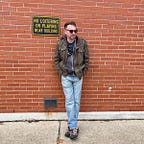Sham On You
I’ve Done My Own Research and Concluded That Michael Jackson’s Moonwalk Was Staged
(With David Waghalter)
I don’t know what you’ve been doing for the past 38 years, but I’ve spent much of that time at home analyzing the so-called “footage” of what many people consider to be a “cultural milestone.” After keeping my suspicions to myself for nearly four decades, I am finally ready to take the glove off and announce my conclusion, which I know many people will find distasteful and which they will even reject. But Houston, we have a problem, and Annie, we are not okay… because Michael Jackson’s “moonwalk” was nothing of the sort. Rather, it was a sham on the American public — no, the whole wide, flat world.
In case you’ve forgotten — or if you weren’t alive when it “happened” — here’s a brief recap of the “event”: On the evening of May 16, 1983, as part of a televised special known as Motown 25: Yesterday, Today, Forever, civilian entertainer Michael Joseph Jackson, then almost 25 years old himself, executed a “moonwalk” that was captured on videotape. The performance received such widespread attention and acclaim that Jackson later both titled his autobiography Moonwalk and starred in a movie titled Moonwalker.
It was a sham on the American public.
And yet Jackson did not actually walk on the moon that evening. I have compiled dozens of reasons that lead to my verdict, but I believe the following three are sufficient to convince anyone whose mind has not been irreversibly corrupted by the mainstream media.
- POINT ONE: On the night in question, the moon was a waxing crescent, but only four days earlier, on May 12, 1983, the moon was new. Simply put, there was not enough moon for Jackson to walk on when he supposedly did.
- POINT TWO: When Jackson was purportedly on the moon, he was dressed in his signature black trousers, silver socks, silver shirt, black-sequined jacket, and black fedora. This ensemble would have been insufficient to protect Jackson from the harsh environment of outer space. Jackson’s outfit would not have provided a stable internal pressure, a supply of breathable oxygen (and elimination of carbon dioxide), or temperature regulation. (Moreover, it likely would not have provided a means of collecting and containing bodily waste — although I acknowledge that such a mechanism might have been present but not visible.)
- POINT THREE: If you watch the footage, as I have several thousand times, you can hear the unmistakable sounds of an audience — cheering, clapping, screaming — as Jackson gracefully slides backward. Yet, as every schoolchild knows, because of the great distance between molecules of matter necessary to propagate audio waves, there is no sound in a near-vacuum. In other words, in space, no one can hear you cheer, clap, or scream.
The inescapable truth therefore is that Michael Jackson’s “moonwalk” was in fact staged. And not just any stage, but the stage of the Pasadena (California) Civic Auditorium — or a stage built to look like the stage of the Pasadena Civic Auditorium.
Simply put, there was not enough moon for Jackson to walk on when he supposedly did.
Unfortunately, for nearly forty years we have (almost) all been duped — willingly, in fact — into believing that history was made that night. Michael Jackson was many things — the man in the mirror, a smooth criminal, bad — but he was no moonwalker. Sadly, when Jackson passed away at age 50 in 2009, any hope of an admission of his role in the choreographed conspiracy died with him.
The real tragedy of this longstanding charade, though, is that it has obscured — eclipsed, even — the earlier, legitimate report of Gordon Matthew Thomas Sumner’s heavenly expedition. In 1979, Sumner, a sometimes member of the English constabulary, participated in a three-man mission, the details of which he memorialized in a recording titled, aptly, “Walking on the Moon.” The specificity with which Sumner relates his experience (“Feet they hardly touch the ground… My feet don’t hardly make no sound”) lends his account credibility and makes it plain that he, unlike Jackson, is to be believed.
